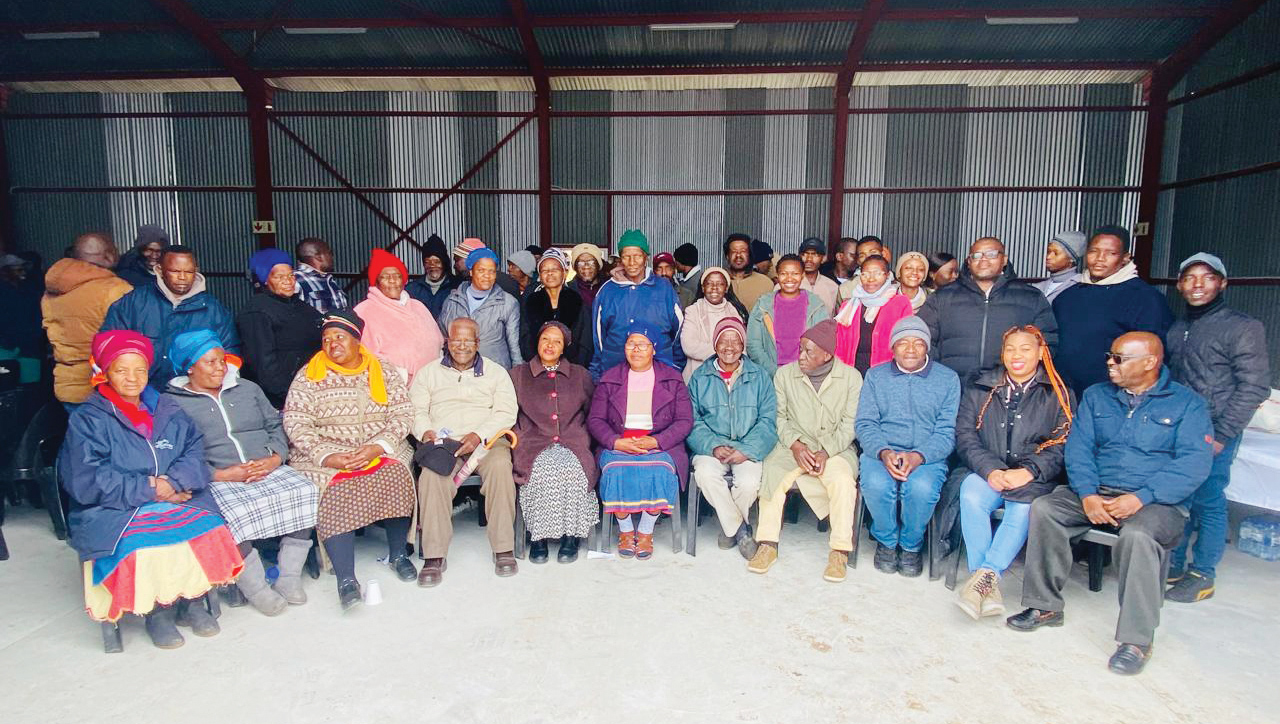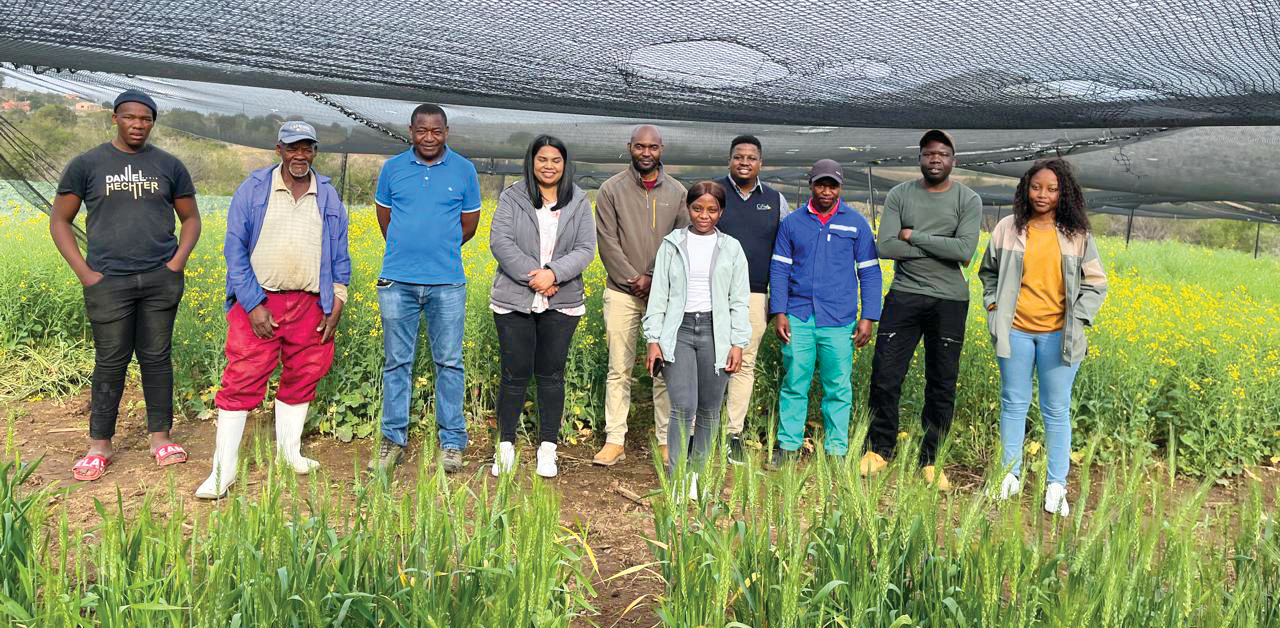January 2025
THE ZANYOKWE IRRIGATION SCHEME (ZIS) FALLS UNDER KEISKAMMAHOEK IN THE EASTERN CAPE. DESPITE HEAVY RAINFALL, MORE THAN 100 PARTICIPANTS GATHERED HERE FOR A FARMERS’ DAY IN SEPTEMBER 2024. THE PURPOSE OF THE EVENT WAS TO PROMOTE THE GROWING OF CERTAIN WINTER AND SUMMER CROPS IN THE EASTERN CAPE.
This farmers’ day is the result of a project led by the Department of Agronomy at Stellenbosch University in collaboration with the Department of Agronomy at the University of Fort Hare. The project focusses on exploring the yield potential and adaptation of grain and oilseed crops in the Eastern Cape, and aims to enhance the agricultural productivity and climate resilience of crops produced in the province.
Preliminary studies by Stellenbosch University (SU) and the University of Fort Hare (UFH) have shown that winter crops such as wheat and canola and summer crops such as soybeans, sorghum and sunflower can be produced successfully in the Eastern Cape.

A group who attended the farmers’ day. The participants gathered in a hall belonging to the Department of Rural Development in the Eastern Cape and Agrarian Reform in Burnshill.
INTERCROPPING
Currently, most of the local farmers grow only maize and do not practise crop rotation. In the winter, most of their fields lie fallow and those with irrigation normally grow vegetables. Thus, farmers were encouraged to practise crop rotation by introducing winter crops such as wheat and canola, as most of them have access to irrigation water in ZIS.
The speakers also motivated the farmers to intercrop maize with leguminous crops such as soybeans, as these can improve soil fertility, increase diversity and reduce the occurrence of crop diseases.
Furthermore, sorghum and sunflowers were highlighted to be climate-resilient crops that can greatly benefit farmers in areas with a low rainfall. The nutritional and health benefits of sorghum were also emphasised, as this crop has the potential to be used as a substitute for maize in human diets.
The farmers showed interest in producing the suggested crops but raised a critical question about market availability for the crops. It was highlighted to the farmers that interventions from several government departments at national level would be required to avail marketing infrastructure, provided that the production levels are high.
WORKING TOGETHER
In the meantime, farmers who are willing to start growing the crops can work together or form co-operatives so that their produce and resources can be pooled together to get a marketable quantity of crops. Currently one local small-scale farmer, Sinelizwi Fakade, is already producing canola under irrigation. If more farmers can join him, their produce can be combined and transported to the buyers.
The extension officer, Xolani Mpengesi, promised to follow up with the farmers to see who is willing to try the new crops. The information will be communicated to the relevant people to get the project started.

Collaborators and stakeholders visited the wheat and canola fields under the shade netting at Lenye in the Zanyokwe Irrigation Scheme.
Partners
The success of the farmers’ day can be attributed to the collaboration of various institutions highlighting a broad and multidisciplinary approach. These are:
The project has a dedicated team of researchers, students and technicians from SU and UFH. Key team members include Prof Pieter Swanepoel (SU), Prof Charles Mutengwa (UFH), Willem Botes (US), Dr Flackson Tshuma (SU), Dr Nyasha Chiuta (UFH) and UFH students Simthandile Bobotyana (PhD), Luyolo S Mzileni (PhD), Vicks S Mbhele (MSc), Sixolile Mkoliswa (MSc) and Sihle Sitshaka (MSc).
BACKGROUND ABOUT COLLABORATIVE STUDIES
Currently, there is limited data on grain and oilseed crop cultivar performance and agronomic practices in the Eastern Cape. Reliable guidance is critical for local grain farmers, and a collaborative study by SU and UFH seeks to provide information on the yield performance, disease resistance and grain quality of different cultivars, as well as insights into the effects of agronomic practices.
Field trials are being conducted in multi-locations (Ugie, Elliot, Zanyokwe and Alice) in the Eastern Cape to allow for the assessment of the grain yield and associated yield components, as well as grain quality in response to different environmental conditions.
The study is also essential for predicting yield differences among cultivars, assessing the cultivar stability across sites/environments and selecting superior cultivars for future planting. By understanding how different cultivars interact with the environment, researchers can recommend the best-performing genotypes for each agroecological zone.
Project highlights
The project presents an outstanding opportunity for student training and capacity building within the agricultural sector, particularly in agronomy. Various undergraduate students from UFH and Lovedale College have conducted their practical research work at the trial site. The involvement of students has been a crucial aspect of the project, providing them with hands-on experience and enhancing their understanding of the challenges and opportunities in crop production.
Future events
The collaboration between SU, UFH and other stakeholders has great potential to motivate and influence farmers to adopt sustainable farming practices, including crop rotations. The next farmers’ day promises to be bigger and better.
ACKNOWLEDGEMENTS
The research team acknowledges the financial support from the Department of Science and Innovation (DSI) and the Technology Innovation Agency (TIA), as well as the Maize Trust. Additionally, the facilitation and coordination by Grain SA, the insights from the Western Cape Department of Agriculture, specifically Piet Lombard, and the involvement of Fort Hare University, specifically Prof Charles Mutengwa, and the Agricultural Research Council, specifically Annelie de Beer, have been invaluable to the project’s progress and success.
Publication: January 2025
Section: Pula/Imvula
Author: Flackson Tshuma and Pieter Swanepoel, both from Stellenbosch University, and Charles Mutengwa and Nyasha Chiuta, both from the University of Fort Hare